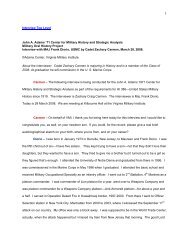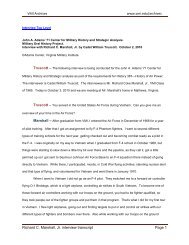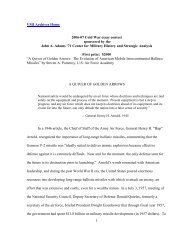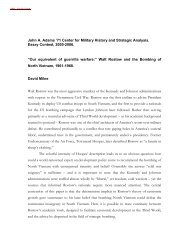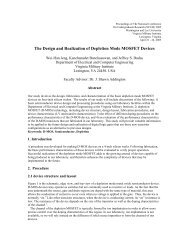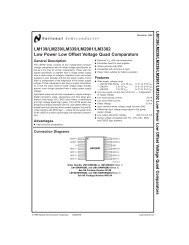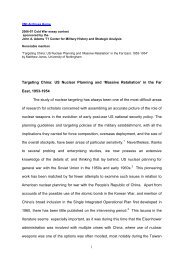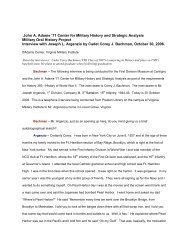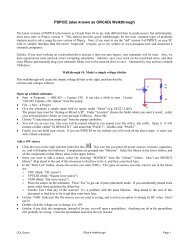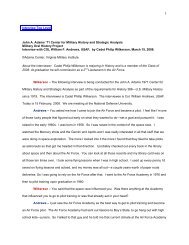Academic Catalog - Virginia Military Institute Admissions
Academic Catalog - Virginia Military Institute Admissions
Academic Catalog - Virginia Military Institute Admissions
You also want an ePaper? Increase the reach of your titles
YUMPU automatically turns print PDFs into web optimized ePapers that Google loves.
<strong>Virginia</strong> <strong>Military</strong> <strong>Institute</strong><br />
12-13 <strong>Catalog</strong>ue<br />
of psychology and the development of major psychological theories. The philosophical and<br />
scientific origins of psychology as a science are analyzed as well as the impact of emerging<br />
movements on important psychologists. The focus of much of the reading is the history<br />
of psychology as reflected by the individuals, theories, and experimental investigations of<br />
this discipline. Rather than focus on broad philosophical and historical issues, the course<br />
is aimed at specific emerging philosophical trends that lead to the development of the<br />
discipline. Prerequisite: PS 201. This course is restricted to First Class psychology majors.<br />
PS 491. SUPERVISED RESEARCH I 0—2—1 to 0—6—3<br />
PS 492. SUPERVISED RESEARCH II 0—2—1 to 0—6—3<br />
Normally a two-semester sequence for first class psychology majors who intend to<br />
pursue graduate studies. Each cadet will design and conduct an experiment under faculty<br />
supervision. Final presentation will include a paper in American Psychological Association<br />
format. Prerequisite: PS 201. Permission of the department head.<br />
PS 495W. INDEPENDENT PROJECT IN LEADERSHIP STUDIES 3—0—3<br />
Each student works under the close supervision of a faculty member on an independent<br />
problem related to leadership studies. Requires research and writing of substantial paper(s)<br />
and an oral examination in defense of the project. Prerequisites: PS 201, PS 344 and<br />
permission of the department head. Note: PS 495 is a required course for the minor in<br />
Leadership Studies and is writing intensive (W).<br />
PHYSICS<br />
DEPARTMENT OF PHYSICS AND ASTRONOMY<br />
DEPARTMENT head: ColONEl THOMPSON<br />
Requirements for a major in physics are specified on page 68.<br />
*Satisfies core curriculum science requirement.<br />
PY 115. LABORATORY FOR PY 120 0—2—1<br />
A laboratory course to investigate the concepts covered in PY 120. Computer generated<br />
graphs, spreadsheets, and regression analysis are required for most experiments. Corequisite:<br />
PY 120.<br />
PY 116. LABORATORY FOR PY 121 0—2—1<br />
A laboratory course to investigate the concepts covered in PY 202. Computer generated<br />
graphs, spreadsheets, and regression analysis are required for most experiments. Corequisite:<br />
PY 121.<br />
PY 120. GENERAL PHYSICS I 3—0—3<br />
PY 121. GENERAL PHYSICS II 3—0—3<br />
Designed as a terminal course in physics for non-science majors, this sequence is a survey<br />
of the concepts and theories of classical and modern physical science. (Not recommended<br />
for mathematics or science majors.) Prerequisite: PY 120.<br />
PY 155. LABORATORY FOR PY 160 * 0—2—1<br />
A laboratory course to investigate the concepts covered in PY 160. Computer generated<br />
graphs, spreadsheets, and regression analysis are required for most experiments. Corequisite:<br />
PY 160.<br />
PY 156. LABORATORY FOR PY 161 * 0—2—1<br />
A laboratory course to investigate the concepts covered in PY 161. Computer generated<br />
graphs, spreadsheets, and regression analysis are required for most experiments. Corequisite:<br />
PY 161.<br />
PY 160. GENERAL PHYSICS I * 3—0—3<br />
This calculus-based sequence constitutes a general course in physics covering the topics<br />
of mechanics, thermodynamics, waves and sound, electricity and magnetism and optics<br />
Prerequisites: Prerequisite: Proficiency in MA 123.<br />
PY 161. GENERAL PHYSICS II * 3—0—3<br />
This calculus-based sequence constitutes a general course in physics covering the topics<br />
of mechanics, thermodynamics, waves and sound, electricity and magnetism and optics<br />
Prerequisites: Proficiency in PY 108 or PY 160.<br />
PY 220. PHYSICS SEMINAR 1—0—1<br />
This course is designed to acquaint students with topics in physics that are being actively<br />
investigated. The topics covered will vary depending on current news within the physics<br />
community as well as the interest of the enrolled students but may include relevant topics<br />
such as Bose-Einstein condensates, string theory and quantum dots. Students will be<br />
required to read articles, give short presentations and write summaries of the topics covered.<br />
As this course is intended to be survey in nature, topics will not be covered in depth and<br />
mathematical analysis will not be emphasized.<br />
PY 223. PROGRAMMING AND DATA ANALYSIS 1—2—2<br />
An introduction to some of the techniques and tools used by practicing physicists. Includes<br />
an introduction to MATLAB programming with emphasis on programming fundamentals,<br />
standard input/output techniques, and data handling. Students learn how to use the Mathcad<br />
software program to do numerical analysis as well as symbolic calculations. Data and error<br />
analysis beyond the fundamentals is introduced and includes such topics as regression<br />
analysis, weighted averages, error propagation, and data analysis.<br />
PY 238. LABORATORY TECHNIQUES 1—2—2<br />
An introduction to analog electronics and associated laboratory techniques and instruments.<br />
PY 253W. OPTICS LABORATORY 0—2—1<br />
A laboratory course in which some of the experiments in classical optics, as well as some<br />
in the field of laser optics will be performed. Prerequisite: PY 161. Co-requisite PY 254.<br />
Writing Intensive (W).<br />
PY 254. OPTICS 3—0—3<br />
A study of geometrical and physical optics, including properties of lens systems,<br />
superposition, interference, diffraction, polarization, an introduction to lasers and elementary<br />
fiber optics. Prerequisite: Either PY 203 or PY 161.<br />
PY 257. ELECTRONICS AND INTERFACING 3—2—4<br />
A course designed to teach the principles of microcomputer control of physics experiments.<br />
Course begins with an introduction to digital electronics, and a short review of analog electronics<br />
(op-amps, transistors), then proceeds to sensors, stepper motors, and microcontrollers<br />
for control of experiments. The rest of the course concentrates on learning LabVIEW and<br />
using it with a student-designed experiment, for automated control and data acquisition.<br />
PY 291-294. SUMMER RESEARCH IN PHYSICS 0—2—1 to 0—8—4<br />
Independent research opportunities in physics and astronomy offered in the summer<br />
sessions. A student working under the supervision of a faculty mentor may earn up to four<br />
credit hours per summer session. An oral presentation and a comprehensive research paper<br />
are required. Prerequisites: permission of the department head and faculty research mentor.<br />
PY 308. INTRODUCTION TO NANOTECHNOLOGY 3—0—3<br />
A course designed to introduce the student to the multidisciplinary and rapidly developing<br />
field of nanotechnology. Topics include nanomaterials, micro/naofabrication, microscopy,<br />
nanoelectronics, biological nanotechnology, nanoterrorism, social and ethical implications,<br />
etc. Prerequisite: PY 160/PY 161 or PY 108/PY 203.<br />
PY 331. INDEPENDENT PROJECT I 0—2—1<br />
Each student works under the close supervision of a faculty member on an independent<br />
problem. This problem may include experimental or theoretical research in the conventional<br />
sense, or development of a new laboratory experiment, or another problem specified by<br />
the instructor.<br />
PY 332. INDEPENDENT PROJECT II 0—2—1<br />
A continuation of the work done in PY 331.<br />
PY 333W. MODERN PHYSICS LABORATORY 0—2—1<br />
A laboratory course to accompany PY 343, Modern Physics. Elementary experiments in<br />
both atomic and nuclear physics will be performed. Prerequisite, or Corequisite: PY 335.<br />
Writing Intensive (W).<br />
PY 334. NUCLEAR PHYSICS LABORATORY 0—2—1<br />
A laboratory course to accompany PY 344, Nuclear Physics. A number of more advanced<br />
nuclear physics laboratory experiments will be performed. Prerequisites: PY 333W and PY 335.<br />
PY 335. MODERN PHYSICS I 3—0—3<br />
An introduction to the topics of modern physics to include the special theory of relativity<br />
including relativistic kinematics and dynamics, early quantum theory, wave-particle duality,<br />
the Uncertainty Principle, the Bohr atom, quantum mechanics, and atomic physics.<br />
Prerequisites: Either PY 203 or PY 161.<br />
PY 336. MODERN PHYSICS II 3—0—3<br />
An extension of PY 335, in which quantum mechanics is used to address a variety of topics<br />
in the areas of statistical physics, molecules and solids, and semiconductor devices. Other<br />
topics covered include nuclear models, radioactive decay, nuclear reactions, elementary<br />
particles, general relativity, and cosmology. Prerequisites: PY 335.<br />
PY 341. ELECTRICITY AND MAGNETISM I 3—0—3<br />
An intermediate level course in electricity and magnetism, designed for physics majors,<br />
which includes the theory of electrostatic and magneto static fields in space and matter,<br />
followed by electrodynamics and the development of the four Maxwell equations. Vector<br />
analysis extensively employed throughout the course. Prerequisite: Either PY 203 or PY 161.<br />
PY 342. ELECTRICITY AND MAGNETISM II 3—0—3<br />
An extension of PY 341, in which the Maxwell equations are used to address a variety of<br />
topics, to include energy in electromagnetic fields, electromagnetic waves, and the covariant<br />
formulation of electrodynamics, among others. Prerequisite: PY 341.<br />
PY 344. NUCLEAR PHYSICS 3—0—3<br />
Nuclear structure, nuclear models, decay processes, reaction cross-sections, reaction<br />
kinematics, neutron dynamics, nuclear reactors, radiation detectors, nuclear accelerators,<br />
particle physics. Prerequisites: PY 161.<br />
PY 391-394. SUMMER RESEARCH IN PHYSICS 0—2—1 to 0—8—4<br />
Independent research opportunities in physics and astronomy offered in the summer<br />
107





